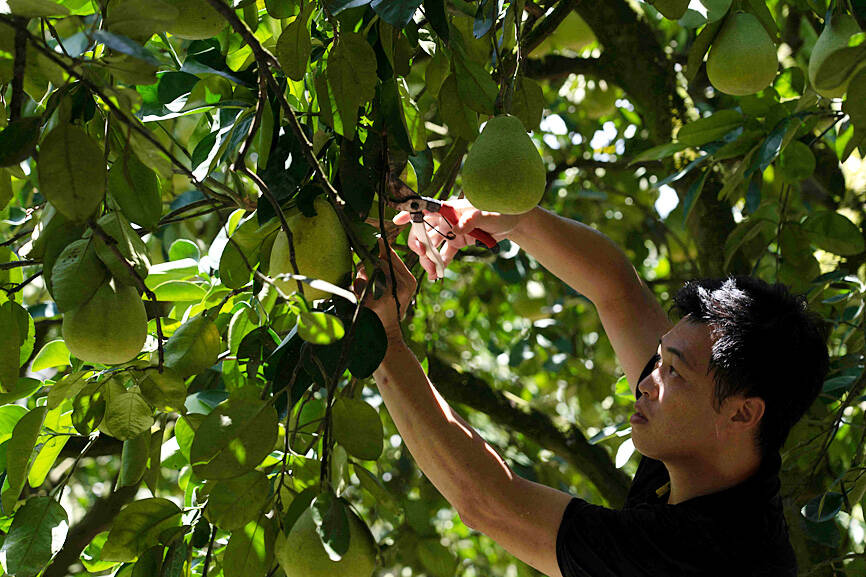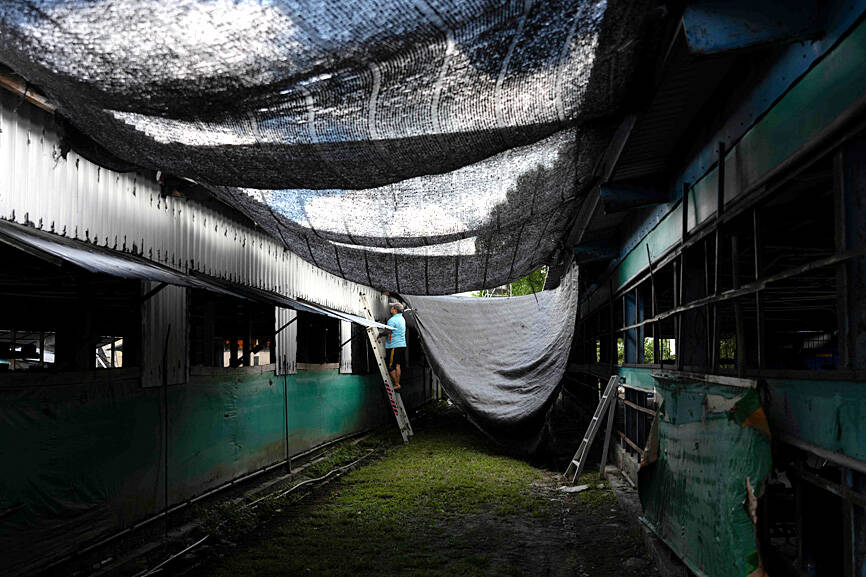As a fighter jet screamed over the lush green fields of Hualien County last week, pomelo farmer Ou Mu-lin sat in his orchard counting the cost of China’s latest push to squeeze the nation.
Cross-strait tensions have risen to their highest level in decades as China rages over a Taiwan visit by US House of Representatives Speaker Nancy Pelosi earlier this month.
Beijing launched drills shortly after Pelosi departed from Taipei, sending missiles into waters around Taiwan, and it torpedoed exports of certain fruit and fish products to China with fresh import bans.

Photo: Asnaya Chou, AFP
The overall impact of China’s latest economic sanctions is limited, but producers such as Ou are paying a painful price.
“Our mainland [China] orders have all been canceled. Our pomeloes have no way of getting there,” he said.
His farm in Hualien’s Ruisui Township (瑞穗) has dispatched about 180,000kg of the citrus fruit to China every year for several decades.

Photo: Asnaya Chou, AFP
“The clients are waiting for the pomeloes, but there’s nothing we can do, it’s a political problem,” he shrugged.
Taiwanese farmers and producers have increasingly had to get used to import bans imposed by Beijing — with Chinese authorities typically citing sudden regulatory discrepancies rather than a direct link to politics.
After Pelosi’s visit, China announced bans on Taiwanese citrus fruit and some mackerel, while halting its own exports to Taiwan of natural sand used in construction.
The month before her visit, it targeted grouper fish, the vast majority of which had previously gone to Chinese consumers.
Taipei said the move was politically motivated, while China claimed it found some fish to be contaminated by banned chemicals.
A year earlier, pineapple imports were halted after Chinese authorities claimed to have discovered pests in shipments, just as the annual harvest was under way.
At a grouper facility in Pingtung County, third-generation farmer Hans Chen of Lijia Green Energy and Biotechnology Co said he would be “severely impacted” if the sanctions were not lifted by the end of the year.
Chen, 35, manages a farm of about 500,000 groupers, and 90 percent of its exports go to China.
He said the ban was imposed without any warning and came at the worst time for producers already bruised by the COVID-19 pandemic.
The fish farmer said his business and others are relying too much on the lucrative Chinese market and need to diversify away from Taiwan’s aggressive neighbor after the surprise ban.
“Everyone felt the COVID-19 situation was slowly improving and the China market is slowly stabilizing and prices will rise again, so there will be ... some profit to make up for the previous losses,” he said. “That’s why everyone’s anxious, and [the sanctions’] effects are very big.”
China remains Taiwan’s largest trading partner, accounting for 28 percent of total exports.
However, the government and businesses have also pushed economic diversification in response to Beijing’s increased aggression under Chinese President Xi Jinping (習近平), the country’s most authoritarian leader in a generation.
Since 2016, President Tsai Ing-wen (蔡英文) has pursued the New Southbound Policy to grow trade with Southeast and other countries in East Asia.
Taiwan is also seeing a surge of sympathy from like-minded democracies in the Asia-Pacific region.
Much of last year’s pineapple harvest was saved when Japanese consumers rushed to purchase “freedom pineapples” in an act of solidarity.
Moreover, China has so far been careful with what it targets.
Taiwan is one of the world’s largest producers of semiconductors, and Beijing has steered clear of hitting a market it leans on to satisfy demand at home.
“China is highly selective in choosing the instruments of economic sanctions against Taiwan,” said Christina Lai (賴潤瑤), a research fellow at Academia Sinica. “It has always refrained from damaging its domestic economy and technology industries. Beijing cannot afford to ban the most crucial imports from Taiwan — semiconductors, high-end instruments or machinery.”
The overall impact on Taiwan’s economy is therefore “very limited,” said Fan Shih-ping (范世平), a professor at National Taiwan Normal University. “It is a political manipulation, as China wants to show it is calling the shots and has control over Taiwan.”
However, for farmers who have become the victims of the latest uptick in tensions, the scale of the sanctions feels seismic.
“We are looking for help from the government, if there’s any way they can help us,” Ou said. “We have to start to find some sales within the country. This is a big headache.”

ALIGNED THINKING: Taiwan and Japan have a mutual interest in trade, culture and engineering, and can work together for stability, Cho Jung-tai said Taiwan and Japan are two like-minded countries willing to work together to form a “safety barrier” in the Indo-Pacific region, Premier Cho Jung-tai (卓榮泰) yesterday said at the opening ceremony of the 35th Taiwan-Japan Modern Engineering and Technology Symposium in Taipei. Taiwan and Japan are close geographically and closer emotionally, he added. Citing the overflowing of a barrier lake in the Mataian River (馬太鞍溪) in September, Cho said the submersible water level sensors given by Japan during the disaster helped Taiwan monitor the lake’s water levels more accurately. Japan also provided a lot of vaccines early in the outbreak of the COVID-19 pandemic,

Kaohsiung Mayor Chen Chi-mai (陳其邁) on Monday announced light shows and themed traffic lights to welcome fans of South Korean pop group Twice to the port city. The group is to play Kaohsiung on Saturday as part of its “This Is For” world tour. It would be the group’s first performance in Taiwan since its debut 10 years ago. The all-female group consists of five South Koreans, three Japanese and Tainan’s Chou Tzu-yu (周子瑜), the first Taiwan-born and raised member of a South Korean girl group. To promote the group’s arrival, the city has been holding a series of events, including a pop-up

TEMPORAL/SPIRITUAL: Beijing’s claim that the next Buddhist leader must come from China is a heavy-handed political maneuver that will fall flat-faced, experts said China’s requirement that the Dalai Lama’s reincarnation to be born in China and approved by Beijing has drawn criticism, with experts at a forum in Taipei yesterday saying that if Beijing were to put forth its own Dalai Lama, the person would not be recognized by the Tibetan Buddhist community. The experts made a remarks at the two-day forum hosted by the Tibet Religious Foundation of His Holiness the Dalai Lama titled: “The Snow Land Forum: Finding Common Ground on Tibet.” China says it has the right to determine the Dalai Lama’s reincarnation, as it claims sovereignty over Tibet since ancient times,

Temperatures in some parts of Taiwan are expected to fall sharply to lows of 15°C later this week as seasonal northeasterly winds strengthen, the Central Weather Administration (CWA) said today. It is to be the strongest cold wave to affect northern Taiwan this autumn, while Chiayi County in the southwest and some parts of central Taiwan are likely to also see lower temperatures due to radiational cooling, which occurs under conditions of clear skies, light winds and dry weather, the CWA said. Across Taiwan, temperatures are to fall gradually this week, dropping to 15°C to 16°C in the early hours of Wednesday